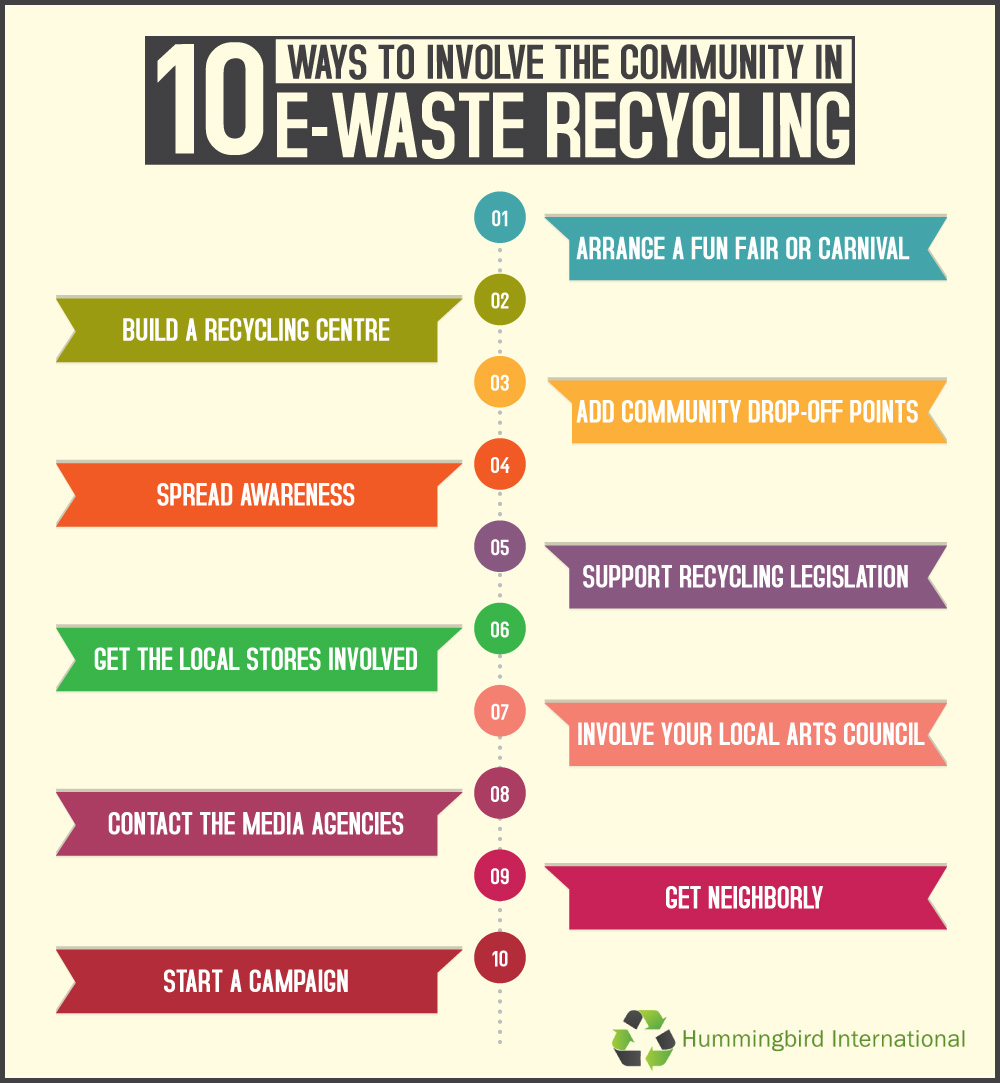10 Ways To Involve The Community In E-Waste Recycling

Featured Image: Source
The population of the world is growing, not shrinking, and currently each human being adds significant waste to the planet over his or her lifetime. In New York alone, people produce enough trash in one day to fill the entire Empire State building. Recycling is one means of ensuring that the items we’ve finished using get returned to the resources pool and either get turned into something else or are cleaned and reused.
The benefits of recycling are innumerable. In the United States alone the recycling effort is responsible for almost 1.1 million jobs. And that number is expected to rise since initiatives are in place to assist others in getting behind the recycling movement. Participating in the green movement will save 15 trees from being destroyed if we recycle only 1 ton of paper. Does 1 ton sound like a lot? Maybe…but not when you consider that approximately 1.5 million tons of construction products are made each year from paper. According to a UK construction blog, Heriot-Watt University teamed up with Brewster Bros to create new products from the waste left from construction and recycling process.
We have previously discussed the corporate social responsibility and now we are going to analyze how everyone in the community has a responsibility, too, to recycle. Unfortunately, not everyone feels motivated to recycle and indeed, it can sometimes seem like a complex undertaking. Yet, coupled with understanding the benefits, once you know how to recycle, you’ll realize it’s not that hard at all. Here are 10 ways to involve the community in E-waste recycling.
1. Build a recycling Centre
Every community needs one! Setup a local recycling centre in your neighborhood. It will be a great way for people to meet and socialize, while recycling and keeping the environment clean.
2. Spread Awareness
When recycling, it’s important to know the benefits. This encourages people to adopt a more positive approach towards recycling. Make flyers explaining the benefits of recycling, the do’s and don’ts and put them all over the neighborhood for people to see. This will spur a more active approach towards recycling.
3. Get the local supermarkets involved
Involving your local supermarket can be a great way to increase the recycling percentage in your community. Suggest starting a bag less day to highlight the importance of saving paper and plastic.
4. Contact the nearby media agencies
We live in the digital age, where Information travels faster than the speed of light! Another step that can be taken is to contact the local newspaper or TV channel. Ask them to come over to your neighborhood and interview the local authorities. Or publish a special in the newspaper explaining the need to recycle.
5. Start a campaign
If you are at school, talk to your Principal or Dean about starting a recycling campaign. Recycling campaigns have always helped increase recycling and spread awareness.
6. Arrange a fun fair or carnival
It is crucial to involve young kids in recycling. Inculcating the concept of recycling in young minds might just be the only way we can save our planet. Organize a small community recycling themed fair with games and prizes. It creates the idea in the minds of children that Recycling is a fun thing to do.
7. Add Community Drop-Off Locations
Discuss the idea of adding drop off points in your community with your local authorities. Community recycling drop-offs are inexpensive, easy to use, and have proven to increase recycling rates.
Residents find the newer drop-offs easy to use because they can mix all the recyclables into one container- no sorting required. Communities like recycling drop-offs because they make a valuable service available to residents requiring little or no staff time.
8. Support recycling legislation
Start a campaign to make recycling a law. Recycling legislation can go a long way in providing incentives for recycling and disincentives for landfilling. Legislatures are getting creative with recycling bills, such as advanced disposal fees, electronics initiatives etc.
9. Involve your local arts council
Art is an excellent way to put one’s message across. Get in touch with your local arts council and discuss arranging a gallery of paintings and sculptures made out of E-waste or try arranging a short play highlighting the benefits of recycling E-waste
10. Get neighborly
Go door to door with a small group and tell people how not recycling E-waste is affecting their future. It’s also a great way to collect funds for your local recycling center which can then be used to further develop the recycling program.
About The Author Kelly Sampson
Kelly Sampson is a writer, blogger, and environmental enthusiast. She has strong opinions about climate change, the dogs vs. cats debate, and Oxford commas. She has lent Hummingbird International her engaging and spirited voice and turned our blog into a great place to find valuable information about e-waste, e-waste recycling, and the ITAD industry. Explore our blog to read more of her work.







